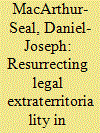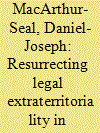|
|
|
Sort Order |
|
|
|
Items / Page
|
|
|
|
|
|
|
| Srl | Item |
| 1 |
ID:
161191


|
|
|
|
|
| Summary/Abstract |
The short-lived Allied occupation of Istanbul produced a distinctive blend of legal innovation and revival, creating new mixed courts, reanimating the contested capitulations, and pressuring the Ottoman government to abandon wartime legislation in favour of new laws conducive to European interests. Such measures were intended to serve a military regime notable as much for its disregard for legal procedure when it suited the interests of the occupying Allies as its insistence on protecting the legal privileges of its own subjects. The article shows how the resulting tensions between Britain and the Istanbul and Ankara governments over law and its enforcement furthered the rift between Britain and Turkey until the eventual abandonment of extraterritoriality during the Lausanne conference in 1923.
|
|
|
|
|
|
|
|
|
|
|
|
|
|
|
|
| 2 |
ID:
161192


|
|
|
|
|
| Summary/Abstract |
The short-lived Allied occupation of Istanbul produced a distinctive blend of legal innovation and revival, creating new mixed courts, reanimating the contested capitulations, and pressuring the Ottoman government to abandon wartime legislation in favour of new laws conducive to European interests. Such measures were intended to serve a military regime notable as much for its disregard for legal procedure when it suited the interests of the occupying Allies as its insistence on protecting the legal privileges of its own subjects. The article shows how the resulting tensions between Britain and the Istanbul and Ankara governments over law and its enforcement furthered the rift between Britain and Turkey until the eventual abandonment of extraterritoriality during the Lausanne conference in 1923.
|
|
|
|
|
|
|
|
|
|
|
|
|
|
|
|
| 3 |
ID:
183758


|
|
|
|
|
| Summary/Abstract |
The article examines the operation of the multiple regimes of alcohol control formulated by Istanbul’s Allied, Ottoman, and Turkish Nationalist authorities that distinguish the period 1918-1923 and their impact on alcohol entrepreneurs and drinkers. By combining Allied and Ottoman police and newspaper reports and the personnel testimony of soldiers, officials, and civilians in the occupied city, the article supplements the small existing literature on Turkish prohibition, which has been mostly focused on the debate in the Grand National Assembly in Ankara and neglects the impact of restrictions and eventual prohibition of alcohol on its sellers and consumers in Istanbul.
|
|
|
|
|
|
|
|
|
|
|
|
|
|
|
|
| 4 |
ID:
183809


|
|
|
|
|
| Summary/Abstract |
Patterns of opium production and distribution shifted immensely over the course of the twentieth century, with output falling by three-quarters, almost nine-tenths of which now takes place in Afghanistan. Supporters of drug prohibition trumpet the success of this long-term decline and hail the withdrawal of the four largest opium producers—India, China, Iran, and the Ottoman empire—from the non-medical market, but this seemingly linear trend conceals numerous deviations of historic significance. Among the most notable and little known is Turkey's prolonged resistance to international restrictions on the narcotics trade and the efforts of state and non-state networks to substitute Turkish opium for the diminishing supply of once-dominant Indian exports to a still opium-hungry China in the first half of the twentieth century. This article uses neglected League of Nations and Turkish government sources alongside international newspapers and diplomatic reports to demonstrate the extent of connections forged by state and non-state actors between Turkey and East Asia, expanding on recent research on trans-Asian connections in commerce and political thought.
|
|
|
|
|
|
|
|
|
|
|
|
|
|
|
|
| 5 |
ID:
161189


|
|
|
|
|
| Summary/Abstract |
The relationship between Turkey and Britain shifted dramatically in the first three decades of the twentieth century, with the one-time diplomatic defender of Ottoman integrity emerging as its most formidable foe during the First World War and War of Independence. Despite this history of enmity, Turco–British relations entered a period of remarkable recovery in the years after 1923 as potential areas of conflict, such as the status of Mosul province and militarisation and access to the Dardanelles and Bosphorus, were resolved. Nevertheless, recriminations with their origins in this crucial period of the collapse of the Ottoman Empire and foundation of the Turkish Republic lingered, sustaining suspicions over British intentions towards Turkey and its neighbours up until the present. Perhaps surprisingly, the UK–Turkey relationship has remained notably cordial in the midst of growing diplomatic hostility between Turkey and its Nato partners over the past two years. In a special issue of Middle Eastern Studies, historians re-examine diplomatic, economic, cultural, and intellectual connections between the two countries during the period 1914–1939, advancing historical scholarship on this crucial relationship through the use of sources from Turkey, Britain, and further afield.
|
|
|
|
|
|
|
|
|
|
|
|
|
|
|
|
|
|
|
|
|